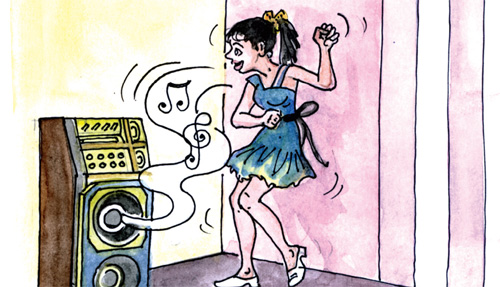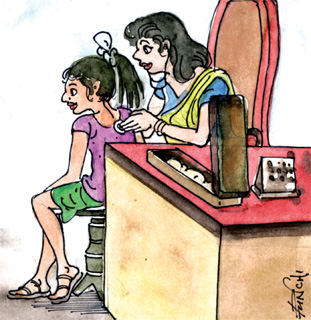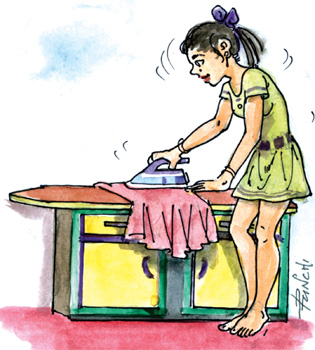|

by R. S. Karunaratne
The difference between 'all' and 'every'
The words 'all' and 'every' have similar meanings. However, the
grammatical rules pertaining to 'all' and 'every' are different.
All
'All' is usually followed by a plural noun.
All men are mortal.
 |
|
Mary was dancing all
morning. |
All shops are closed on Poya day.
All children are different.
All of us make mistakes.
All my friends are living abroad.
All these bills have to be paid today.
All roads have been carpeted.
All trains are late today.
All animals need food and water.
I've read all the books in the library.
All the computers are not functioning properly.
All languages have verbs.
All trains stop at Maradana.
Every
'Every' is followed by a singular noun.
Every child has different needs.
Every teacher makes mistakes.
Not every mistake is important.
He played nearly in every cricket match.
Every house in this village has a well.
I walk two kilometres every day.
Every plate in this hotel is dirty.
Do you believe every word he tells you?
Sandra works every day except Sunday.
Every day in this class is exciting.
Not every Sri Lankan speaks Tamil.
The doctor examined every patient.
The professor knows every one of his students.
I learnt Latin at school but I've forgotten every word.
All + singular noun
When 'all' is followed by a singular noun it means 'every part of it.'
I was waiting here all day.
Mary was dancing all morning.
He was sleeping all afternoon.
We were playing all evening.
Useful expressions
They were travelling all night.
We don't go to school every day.
 |
|
The doctor examined every
patient. |
He phones me every day.
Father comes home every three days.
She gets a day off every two weeks.
I phone my sister every other day.
Mother worries about her son all the time.
All my life I tried to learn English.
A: I'm going home now.
B: all right. (OK)
'Every' and 'each' have the same meaning. However, 'every' is more
common.
Every child must do his studies well.
The journalist posed the same question to every parliamentarian.
Each parliamentarian gave a different answer.
We use 'every' for three or more.
She wore a ring on every finger.
We use 'each' for two or more.
Kavithi had a handkerchief in each hand.
Before 'of' we use 'every one.'
Every one of you must bring your cameras.
I've read every one of these books.
Every one of these apples is rotten.
Every one of his teachers commended him.
'Every minute, every move, every word, every corner' and 'every time'
are written as two words.
I enjoyed every minute of it.
The press is reporting every move of her activities.
I can remember every word he said.
We looked for him in every corner.
I see her every time I go to the library.
Match words and meanings
Here's an exciting way to enrich your vocabulary. Match the words in
column A with their meanings in column B and check your answers with the
key. The first has been done for you.
[Column A]
P 1. delectation
... 2. delete
... 3. deleterious
... 4. deletion
... 5. deliberate
... 6. deliberately
... 7. deliberation
... 8. delicacy
... 9. delicate
... 10. delicatessen
... 11. delicious
... 12. delight
... 13. delighted
... 14. delightful
... 15. delimit
... 16. delineate
... 17. delinquency
... 18. delirious
... 19. deliveryman
... 20. delouse
... 21. delude
... 22. deluge
... 23. delusive
... 24. deluxe
... 25. demand
[Column B]
A. harmful
B. unable to speak due to mental confusion
C. a man who delivers goods to houses
D. to remove lice
E. false
F. a large amount of rain or water
G. having a very pleasant taste
H. something rare that is good to eat
I. needing careful treatment
J. unacceptable behaviour of a young person
K. the removal of something
L. to deceive
M. intentionally
N. to describe the edge of something
O. very pleasant
P. great pleasure and enjoyment
Q. intentional or planned
R. great pleasure
S. to mark the limits of something
T. to ask for something forcefully
U. of very high quality
V. very pleased
W. a small shop that sells high quality foods
X. discussing something
Y. to remove or draw a line through something
Key:
2. Y 3. A 4. K 5. Q 6. M 7. X 8. H 9. I 10. W 11. G 12. R 13. V 14. O
15. S 16. N 17. J 18. B 19. C 20. D 21. L 22. F 23. E 24. U 25. T
Starters :
Emphatic pronouns
The emphatic pronouns are: "myself, ourselves, yourself, yourselves,
himself, herself, itself" and "themselves." An emphatic pronoun means
"without help."
Myself
I built this house myself.
I service my car myself.
I develop my photographs myself.
 |
|
She pressed the clothes
herself. |
I drove the car myself.
I cooked dinner myself.
Ourselves
We painted the house ourselves.
We decorated the hall ourselves.
We published a children's magazine ourselves.
We caught the robber ourselves and handed him over to the police.
Yourself
I know that you built this boat yourself.
I am sure you design your clothes yourself.
You yourself took the children to the museum.
You yourself drove the visitors to Anuradhapura.
You yourself told me the secret.
Yourselves
Are you doing all the painting yourselves?
You yourselves have to decide what to do now.
You yourselves plotted against the king.
You yourselves wanted to contest the elections.
You yourselves will suffer for what you are doing now.
Himself
He built the garage himself.
He washed his clothes himself.
He himself saved the drowning child.
The minister himself gave me the appointment letter.
The ambassador himself drove the car.
Herself
She pressed the clothes herself.
She herself taught English to her children.
She herself cooked dinner for the visitors.
She washes the floor herself every Sunday.
Itself
The song itself was not very good but it became very popular.
The story itself is not interesting.
The medicine itself cannot heal patients; they need care.
Smoking itself is harmful to health.
The crow itself is an ugly bird.
Themselves
Most villagers eat a lot of vegetables. They grow them themselves.
Those who wash their cars themselves enjoy it.
They themselves do not know what to do now.
The ministers themselves were present at the prize-giving.
Teachers themselves should follow refresher courses from time to time.
Quiz on idioms
An idiom is a special kind of phrase. It is a group of words which
have a different meaning when used together from the one it would have
if the meaning of each word were taken individually. Tick the meaning
and check your answers with the key.
1. If someone drives a coach and horses through an agreement ...
(a) their actions will weaken it
(b) their actions will strengthen it
(c) their actions will have no impact on it
2. If someone is taking coals to Newcastle ...
(a) they are doing the right thing
(b) they are doing something worse
(c) they are doing something silly
3. If you are hauled over the coals by someone ...
(a) they will praise you profusely
(b) they will treat you severely for some wrong you have done
(c) they will dismiss you without prior notice
4. If someone is raking over the coals ...
(a) they are talking about a past incident that should have been
forgotten
(b) they are reminiscing their past
(c) they are happy to recollect past memories
5. If the coast is clear ...
(a) there are no storms
(b) you can sail your boat easily
(c) you will have no one to obstruct you
6. If you trail your coat ...
(a) you risk losing something precious
(b) you risk starting an argument
(c) you risk incurring the wrath of someone
7. If something blows away the cobwebs ...
(a) it makes you feel sad
(b) it makes you feel lively
(c) it makes you feel dejected
8. If you describe an excuse or explanation as a cock and bull story
...
(a) you don't believe it
(b) you believe it
(c) you enjoy it
9. Wake up and smell the coffee ...
(a) be more realistic
(b) be happy
(c) be on the alert
10. If you pay someone back in their own coin ...
(a) you start a fight
(b) you settle a debt
(c) you treat them in the same way they have treated you
Key:
1. (a) 2. (c) 3. (b) 4. (a) 5. (c) 6. (b) 7. (b) 8. (a) 9. (a) 10.
(c) |

